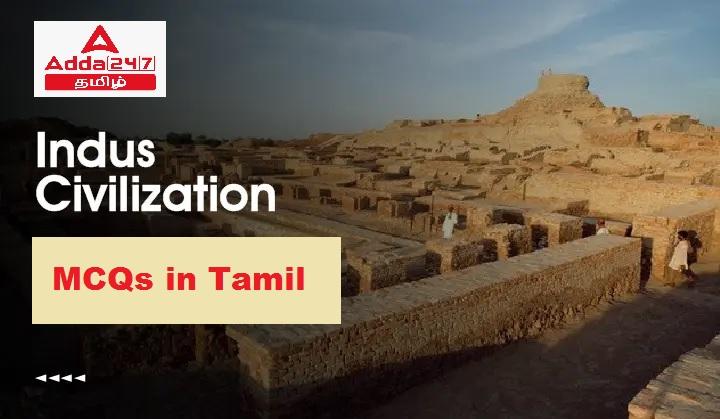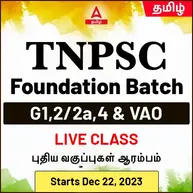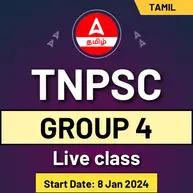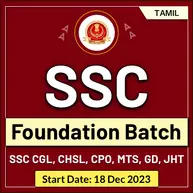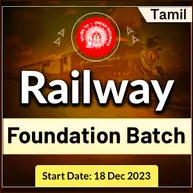ADDA 247 Tamil is giving you Indus Civilization MCQs for all competitive exams. Here you get Multiple Choice Questions and Answers with Solutions. Here you will find all the important questions and answers that will help you increase your knowledge and move you toward fulfilling your goals. Study these Indus Civilization MCQs and succeed in the exams.
Q1. What metals were known to the people of Indus Civilization?
(a) Copper, bronze, silver, gold, but not iron
(b) Copper, silver, iron, but not bronze
(c) Copper, gold, iron, but not silver
(d) Copper, silver, iron, but not gold
S1.Ans.(a)
Sol.
- The ornaments were made of gold, silver, ivory, shell, copper, terracotta and precious stones.
- Horse and iron were unknown to the people of Indus.
Q2. Indus Civilisation belonged to
(a) old Stone age
(b) Medieval stone age
(c) New stone age
(d) Metal age
S2.Ans.(d)
Sol.
Period : Bronze Age
Q3. River valleys are said to be the cradle of civilisation because
(a) Soil is very fertile.
(b) They experience a good climate.
(c) They are useful for transportation.
(d) Many civilisations flourished on river valleys.
S3.Ans.(d)
Sol.
- The plains have been the cradle of civilization from the earliest times.
- For example: the Indus in India, the Nile Valley in Egypt are some of the early civilisations that developed and flourished.
Q4. Statement: Harappan civilization is said to be an urban civilization.
Reason: It has well planned cities with advanced drainage systems.
(a) Statement and reason are correct.
(b) Statement is wrong.
(c) Statement is true, but the reason is wrong.
(d) Both statements and reasons are wrong.
S4.Ans.(a)
Sol.
Urban Civilisation
Harappan civilisation is said to be Urban Civilisation:
- Well-conceived town planning
- Astonishing masonry and architecture
- Priority for hygiene and public health
- Standardised weights and measures
- Solid agricultural and artisanal base
Q5. Statement: Harappan civilization belongs to the Bronze Age.
Reason: Harappans did not know the use of iron.
(a) Statement and reason are correct.
(b) Statement is wrong.
(c) Statement is correct, but the reason is wrong.
(d) Both statements and reasons are wrong.
S5.Ans.(a)
Sol.
- Period : Bronze Age
- Bronze Age: It is a historical period characterised by the use of articles made of bronze.
- Horse and iron were unknown to the people of Indus.
Q6. Statement: The engineering skill of Harappans was remarkable.
Reason: Building of docks after a careful study of tides, waves and currents.
(a) Statement and reason are correct.
(b) Statement is wrong.
(c) Statement is correct, but the reason is wrong.
(d) Both statement and reason are wrong.
S6. Ans.(a)
Sol.
Statement and reason are correct.
Q7. Which of the following statements about Mohenjo-Daro is correct?
(a) Gold ornaments were unknown.
(b) Houses were made of burnt bricks.
(c) Implements were made of iron.
(d) Great Bath was made watertight with the layers of natural bitumen
S7. Ans.(d)
Sol.
The Great Bath (Mohenjo-daro)
- The great bath was a large, rectangular tank in a courtyard.
- Example of a water-proof structure.
- The bath was lined with bricks, coated with plaster and made water-tight using layers of natural bitumen.
Q8. Consider the following statements.
- Uniformity in layout of town, streets, and brick sizes
- An elaborate and well laid out drainage system
- Granaries constituted an important part of Harappan Cities
Which of the above statements are correct?
(a) 1&2
(b) 1&3
(c) 2&3
(d) all the three
S8. Ans.(d)
Sol.
all the three
Q9. Find out the wrong pair
(a) ASI – John Marshall
(b) Citadel – Granaries
(c) Lothal – dockyard
(d) Harappan civilisation – River Cauvery
S9. Ans.(d)
Sol.
Harappan civilisation – River Cauvery
Q10.The Archaeological Survey of India was founded by ______
(a) John Marshall
(b) Mortimer Wheeler
(c) Alexander Cunningham
(d) James Prinsep
S10. Ans.(c)
Sol. Alexander Cunningham
III. Fill in the Blanks
- _______________ is the oldest civilization. (Harappa)
- The Archaeological Survey of India was founded by ______ .(Alexander Cunningham)
- ________ were used to store grains. (Granaries)
- Group of people form _______. (Society)
State True or False:
- Mehrgarh is a Neolithic site. (True)
- Archaeological survey of India is responsible for preservation of cultural monuments in the country. (True)
- Granaries were used to store grains. (True)
- The earliest form of writings was developed by the Chinese. (False)
Match the following
A.Mohenjo-Daro – 1.raised platform
B.Bronze – 2.red quartz stone
C.Citadel – 3.alloy
D.Carnelian – 4.mound of dead
Ans:
Mohenjo-Daro
Bronze – alloy
Citadel – raised platform
Carnelian – red quartz stone
Tamil Medium
சரியான விடையைத் தேர்ந்தெடு
Q1. சிந்து வெளி மக்கள் எந்த உலோகங்களைப் பற்றி அறிந்திருந்தனர்?
(a) செம்பு, வெண்கலம், வெள்ளி, தங்கம்
(b) செம்பு, வெள்ளி, இரும்பு,வெண்கலம்
(c) செம்பு, தங்கம், இரும்பு, வெள்ளி
(d) செம்பு, வெள்ளி, இரும்பு, தங்கம்
S1.Ans.(a)
Sol.
- தங்கம், வெள்ளி, தந்தம், சங்கு, செம்பு, சுடுமண் மற்றும் விலையுயர்ந்த கற்களால் அணிகலன்கள் செய்யப்பட்டிருந்தன.
- சிந்துவெளி மக்கள் இரும்பு மற்றும் குதிரையை அறிந்திருக்கவில்லை.
Q2. சிந்து வெளி நாகரிகம் எக்காலத்தைச்சார்ந்தது
(a)பழைய கற்காலம்
(b) இடைக்கற்காலம்
(c) புதிய கற்காலம்
(d) உலோக காலம்
S2.Ans.(d)
Sol.
காலப்பகுதி – வெண்கலக்காலம்
Q3. ஆற்றங்கரைகள் நாகரிகத்தொட்டில்கள்’ என அழைக்கப்படக் காரணம்
(a) மண் மிகவும் வளமானதால்
(b) சீரான கால நிலை நிலவுவதால்
(c) போக்குவரத்திற்குப் பயனுள்ளதாக இருப்பதால்
(d) பெரும்பாலான நாகரிகங்கள் ஆற்றின் கரைகளில் தோன்றியதால்.
S3.Ans.(d)
Sol.
- ஆற்றுச் சமவெளிகள் பண்டைய நாகரிகங்களின் தொட்டிலாக விளங்கின.
- இந்தியாவில் சிந்து நதி மற்றும் எகிப்தின் நைல் நதி போன்ற ஆற்றுச் சமவெளிகளில் நாகரிகங்கள் தோன்றி செழித்தோங்கி வளர்ந்தன.
II கூற்றைக் காரணத்தோடு பொருத்துக.
சரியான விடையைத் தேர்ந்தெடு.
Q4. கூற்று – ஹரப்பா நாகரிகம் ஒரு நகர நாகரிகம் எனலாம்.
காரணம் – திட்டமிடப்பட்ட நகர அமைப்பு, மேம்பட்ட கழிவு நீர் அமைப்பு
(a) கூற்றும் காரணமும் சரி.
(b) கூற்று தவறு, காரணம் சரி.
(c) கூற்று சரி, காரணம் தவறு.
(d) கூற்றும் காரணமும் தவறு.
S4.Ans.(a)
Sol.
நகர நாகரிகம்
ஹரப்பா நாகரிகம் ஒரு நகர நாகரிகம்:
- சிறப்பான நகரத் திட்டமிடல்
- சிறப்பான கட்டிடக்கலை வேலைப்பாடு
- தூய்மைக்கும், பொதுச் சுகாதாரத்திற்கும் கொடுக்கப்பட்ட அதிக முன்னுரிமை
- தரப்படுத்தப்பட்ட எடைகள் மற்றும் அளவீடுகள்
- விவசாய மற்றும் கைவினைத் தொழில்களுக்கானத் திடமான அடித்தளம்
Q5.
கூற்று – ஹரப்பா நாகரிகம் வெண்கல காலத்தைச் சார்ந்தது.
காரணம் – ஹரப்பா மக்களுக்கு இரும்பின் பயன் தெரியாது.
(a) கூற்றும் காரணமும் சரி.
(b) கூற்று தவறானது, காரணம் சரி
(c) கூற்று சரியானது, ஆனால் அதற்கான காரணம் தவறானது.
(d) கூற்று மற்றும் காரணம் தவறானவை.
S5.Ans.(a)
Sol.
காலப்பகுதி – வெண்கலக்காலம்
- வெண்கலக் காலம் என்பது, மக்கள் வெண்கலத்தாலான பொருள்களைப் பயன்படுத்திய காலம் ஆகும்.
- சிந்துவெளி மக்கள் இரும்பு மற்றும் குதிரையை அறிந்திருக்கவில்லை.
Q6.
கூற்று – ஹரப்பா மக்களின் பொறியியல் திறன் குறிப்பிடத் தக்கது
காரணம் – கடலின் அலைகள், ஓதங்கள் நீரோட்டத்தைக் கணித்த பின் கப்பல் கட்டும் தளத்தைக் கட்டியிருப்பது.
(a) கூற்றும் காரணமும் சரி.
(b) கூற்று தவறானது, காரணம் சரியானது.
(c) கூற்று சரியானது, ஆனால் அதற்கான காரணம் தவறானது.
(d) கூற்று மற்றும் காரணம் தவறானவை.
S6.Ans.(a)
Sol. கூற்றும் காரணமும் சரி.
Q7. கீழே கூறப்பட்டுள்ள மொகஞ்ச-தாரோவை பற்றிய கூற்றுகளில் எவை சரியானவை?
(a) தங்க ஆபரணங்கள் பற்றித் தெரியவில்லை
(b) வீடுகள் சுட்ட செங்கற்களால் கட்டப்பட்டன.
(c) கருவிகள் இரும்பினால் செய்யப்பட்டன.
(d) பெருங்குளம் நீர் கசியாமல் இருப்பதற்காக பல அடுக்குகளால் இயற்கை தார் கொண்டு பூசப்பட்டன.
S7. Ans.(d)
Sol.
பெருங்குளம் – மொகஞ்ச-தாரோ
- இந்த பெருங்குளமானது நன்கு அகன்று, செவ்வக வடிவத்தில் அமைந்திருந்த நீர்த்தேக்கம் ஆகும். இது நகரின் நடுவில் அமைக்கப்பட்டுள்ளது.
- நீர் கசியாத கட்டுமானத்துக்கான மிகப் பழமையான சான்று எனலாம்.
- இக்குளத்தின் சுவர்கள் சுட்ட செங்கற்களால் கட்டப்பட்டு, நீர் கசியாமல் இருப்பதற்காக சுவரிலும், தளத்திலும் பல அடுக்குகள் இயற்கைத் தார் கொண்டு பூசப்பட்டிருந்தன.
Q8. கீழ்க்காணும் கூற்றை ஆராய்க.
- நகரங்கள், தெருக்களின் வடிவமைப்பு மற்றும் செங்கல் அளவுகள் ஆகியவற்றில் சீரான தன்மை.
2 ஒரு விரிவான மற்றும் நன்கு வடிவமைக்கப்பட்ட வடிகால் அமைப்பு.
3.தானியக் களஞ்சியம் ஹரப்பா நகரங்களில் முக்கியமான பகுதியாக
விளங்கியது.
மேலே கூறப்பட்ட கூற்றுகளில் எது / எவை சரியானவை?
(a) 1&2
(b)1&3
(c) 2&3
(d) அனைத்தும் சரி
S8. Ans.(d)
Sol. அனைத்தும் சரி
Q9. தவறான இணையைத் தேர்ந்தெடு
(a) ASI – ஜான் மார்ஷல்
(b) கோட்டை – தானியக்களஞ்சியம்
(c) லோத்தல் – கப்பல் கட்டும் தளம்
(d) ஹரப்பா நாகரிகம் – காவிரி ஆறு
S9. Ans.(d)
Sol.
ஹரப்பா நாகரிகம் – காவிரி ஆறு
Q10.இந்திய தொல்பொருள் ஆய்வு மையம் (ASI) நிறுவப்பட்டது _______ ஆல்.
(a) ஜான் மார்ஷல்
(b) மோர்டிமர் வீலர்
(c) அலெக்சாண்டர் கன்னிங்கம்
(d) ஜேம்ஸ் பிரின்ஸெப்
S10. Ans.(c)
Sol. அலெக்சாண்டர் கன்னிங்கம்
கோடிட்ட இடத்தை நிரப்புக:
1._________ மிகப் பழமையான நாகரிகம். (அரப்பா)
- இந்தியாவின் தொல்லியல் ஆய்வுத் துறை _____ என்ற நில அளவையாளர்
உதவியுடன் தொடங்கப்பட்டது. (அலெக்சாண்டர் கன்னிங்காம்)
3._________ தானியங்கள் சேகரித்து வைக்கப் பயன்பட்டது. (கிரானரிகள்)
- மக்கள் குழுக்களாகச் சேர்ந்து _____ தை உருவாக்குகிறார்கள். (சமூகம்)
சரியா? தவறா?:
- மெஹர்கர் புதிய கற்கால மக்கள் வாழ்ந்த ஓர் இடமாகும். (சரி)
- இந்தியாவின் தொல்பொருள் ஆய்வியல் துறை தொல்பொருள் ஆராய்ச்சிக்கும், நாட்டின்கலாச்சாரநினைவுச்சின்னங்களின் பாதுகாப்பிற்கும் பொறுப்பானது.(சரி)
- தானியக் களஞ்சியம் தானியங்களைச் சேகரித்து வைப்பதற்காகப் பயன்படுத்தப்பட்டது.(சரி)
- முதல் எழுத்துவடிவம் சீனர்களால் உருவாக்கப்பட்டது.(தவறு)
பொருத்துக:
- மொகஞ்ச-தாரோ – மேடான பகுதி
- வெண்கலம் – சிவப்பு மணிக்கல்
- கோட்டை – உலோகக் கலவை
- கார்னிலியன் — இறந்தோர் மேடு
விடை:
மொகஞ்ச-தாரோ – இறந்தோர் மேடு
வெண்கலம் – உலோகக் கலவை
கோட்டை – மேடான பகுதி
கார்னிலியன் — சிவப்பு மணிக்கல்
**************************************************************************
| Adda247 TamilNadu Home page | Click here |
| Official Website=Adda247 | Click here |

